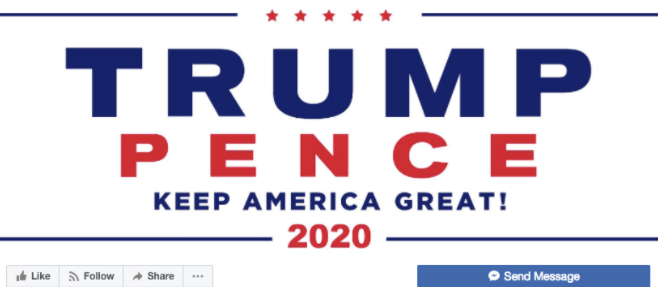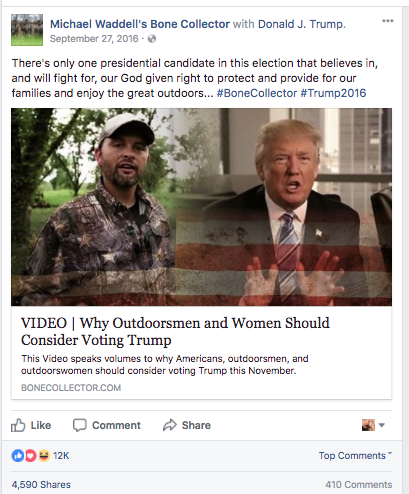The “Trump 2020” Facebook page launched on Nov. 10, 2016, two days after the presidential election. With a few thousand dollars in paid promotion and savvy management, the page grew fast, to 360,000 likes in less than a year. The page’s owner, who identified himself as a Wisconsin businessman but declined to be named, told VICE News that he launched nine more pro-Trump pages, amassing a combined 1,758,173 likes. The man has paid Facebook $34,100 since November to promote these pages, according to receipts shown to VICE News.
Pages like “Trump 2020,” which are set up by people outside of campaigns or political groups, have become an increasingly common and powerful advocacy tool. But the operators of these pages may also be violating elections law, according to campaign finance watchdogs.
Videos by VICE
On Facebook and other digital platforms, no one — not Facebook or the Federal Elections Commission (FEC) — vets political content that’s backed by advertising dollars. This, experts warn, has turned Facebook into a vast, opaque, and unmonitored world where political advocacy has become hard to distinguish from political advertising.
In the aftermath of Facebook’s admission that a Russian troll farm spent $100,000 on political ads during the 2016 election, Washington is newly interested in campaign finance laws for digital ads. But experts say that the Russian troll farm revelation is only a small slice of the unknown political spending on Facebook.
“Dark money on social media is the underlying bigger story that might be missed with all the focus on Russia,” said Alex Howard, the deputy director of the Sunlight Foundation, a nonpartisan government transparency group. Experts also worry that money from wealthy individuals, shadowy political nonprofits, or business interests is being used to promote content on Facebook that escapes the scrutiny of other lobbying efforts.
Facebook is, of course, full of political speech, but the platform’s advertising system lets anyone spend money to promote posts containing political views. In any medium, ad buyers are legally required to report to the FEC any expenditure over $250 that explicitly advocates for the election or defeat of a political candidate.
In less than two days of searching, VICE News found numerous Facebook pages promoting or attacking Democrat and Republican candidates that were clear-cut or potential campaign finance violations. VICE News did not have access to any of the so-called “dark posts” that allow users to post content without it appearing on a page’s feed, suggesting there are far more violations waiting to be found.
Political content boosted by ad money on Facebook can have immense reach. With a few advertising dollars, one April video from the same owner as the Trump 2020 page received more than 27 million views and over 450,000 shares, spreading so pervasively into the conservative media universe that Donald Trump’s official Facebook page shared it two days later. “It changed minds,” the page’s owner said of the video.
A spokesperson for Facebook declined to comment, and pointed VICE News to a section of its advertising policy that reads “advertisers are responsible for understanding and complying with all applicable laws and regulations.”
“There’s no vetting on Facebook political ads whatsoever,” one director of digital ads for a 2016 presidential campaign told VICE News. “I could go and create a Facebook page for Eliot Spitzer and say we are launching his political comeback, and there’s nothing Facebook would do to vet it. It’s very easy to buy ads without Facebook or users knowing who’s really behind it.”

This activity goes unchecked partly because there’s little to no monitoring or enforcement of the few laws that are already on the books, enabling unknown sums of money from domestic and foreign political players to course through Facebook.
Under current law, Facebook has no liability for running ads that violate FEC laws; individual page owners are responsible if they violate FEC disclosure rules. Still, it appears Facebook is rife with potentially illegal political content that’s boosted by ad dollars — such as posts on the Trump 2020 page.
“This [Trump 2020 page] is a clear violation if the person who paid to distribute this express advocacy failed to report it to the FEC,” said Paul S. Ryan, vice president of policy and litigation at Common Cause, a left-leaning ethics and elections watchdog group. “But the FEC is a broken agency.”
Ordinarily, the fines imposed for failures to disclose are small, and can add up to a few hundred or thousand dollars and take several years to process, depending on the nature and number of the violations. In October 2015, the Ohio coal giant Murray Energy paid a $5,000 fine for anti-Obama signs it circulated during the 2012 election.
The owner of the Trump 2020 page told VICE News that he did not report the spending to the FEC and didn’t believe he had to. He said Facebook also never informed him of any FEC laws on political speech.
“This [Elect Trump 2020 page] appears to be a volunteer engaging in online political activity to support his favorite candidate, which should be encouraged, but once he begins to spend real money on promoting a candidate, it falls under campaign finance laws,” said Brendan Fischer, who oversees FEC-related matters at the Campaign Legal Center. “This is the tip of the iceberg.”
FEC spokesman Christian Hilland declined to comment on the potential violations outlined in this story, citing commission policy.
“There’s no vetting on Facebook political ads whatsoever”
“The commission uses a variety of methods to uncover possible election law violations,” said Hilland. “This includes the review of campaign finance reports, the administrative fine program for committees that fail to file timely reports, the complaint process, as well as the option to audit committees after an election cycle.”
Still, one FEC official, who requested anonymity in order to speak candidly, told VICE News that there is no one at the agency who is actively monitoring social media for election law violations.
Another such potential violation is a September 2016 Facebook post with over 4,500 shares from Michael Waddell, host of the Outdoor Channel’s hunting show “Bone Collector.” In it, Waddell praises Trump as the only candidate who will protect the rights of outdoorsmen and links to a page hosting a Trump campaign YouTube video. A search using CrowdTangle, a Facebook-owned tool, indicates that this post was a paid promotion.

While it’s unclear whether Waddell spent over $250 on the advertisement, the ad potentially violated two FEC laws since Waddell advocated expressly for a candidate and paid money to distribute official campaign materials, which should be reported as an official contribution to the campaign no matter the dollar amount. If a user spent $2,700 promoting the ad, then that would be a third violation for exceeding the federal donation maximum. Waddell did not report any such political spending with the FEC, according to an agency spokesman who searched through their records for the 2016 election at the request of VICE News.
Tom Caraccioli, Outdoor Channel vice president of communications, told VICE News that the channel does not operate Waddell’s page. Waddell did not respond to a request for comment relayed through Caraccioli.
The election law complications on Facebook reflect broader problems arising from the opacity of the platform’s ad network, which allows ad buyers to target audiences with geographic and demographic precision that can easily escape the public and regulatory scrutiny that a television, radio, or newspaper ad would be subject to.
The FEC and the Federal Communications Commission have more stringent rules for political ads on TV, which require “public inspection files” that document the political programming they host. Facebook, meanwhile, is under no legal obligation to disclose such information, and its closed ecosystem makes it more difficult to monitor from the outside.
“Dark money on social media is the underlying bigger story that might be missed with all the focus on Russia”
The ability to segment audiences — by race, occupation, gender, interests, political affiliation, and congressional district — allows Facebook ad customers to target messages, whatever their content, to Americans, while escaping public disclosure.
Borrell Associates, a firm that tracks ad spending, estimated that $1.4 billion was spent on digital political advertising in 2016 — a 789 percent increase from 2012. The total political spending on Facebook is unknown since political groups are not required to break out Facebook spending as a specific line item, as they are required to do with political ads on television. Campaigns also frequently disguise digital ad spending by hiring a consultant to purchase the ads for them — and sometimes those consultants hire another consultant, making the money twice removed from the original campaign.
“While the world changes, the [FEC] has not adapted with it and has failed to acknowledge the importance of providing transparency to the public no matter what the medium of political communication,” said then-FEC commissioner Ann Ravel in October 2014. Ravel resigned this past February, citing dysfunction at the agency and telling Rachel Maddow that the 42-year-old agency is “unable to perform the functions that Congress intended that we would do.”
Spurred on by the revelations of Russian Facebook spending, Democrats in Washington are demanding that the FEC impose new regulations on digital ads. Congressional Democrats sent a letter to the FEC on Wednesday asking it to eliminate “loopholes” that allowed foreign actors to buy digital ads designed to influence U.S. politics. And on Thursday night, a separate letter being circulated among Senate Democrats showed that they are readying legislation to more closely align digital political advertising rules with the requirements for broadcast TV ads.
On Thursday, Mark Zuckerberg, Facebook’s CEO, announced a series of changes aimed at making political advertising on Facebook more transparent, and said the company would release the 3,000 ads believed to have been purchased by Russian operatives during the 2016 election. He also said that Facebook would create a system to allow users to view the political ads purchased by a Facebook page. Earlier this month, Facebook told VICE News that it would not release the content of the ads to the public, as is its policy with all other ad purchases.
“We are increasing our investment in security and specifically election integrity. In the next year, we will more than double the team working on election integrity,” Zuckerberg said in the Facebook Live broadcast. “In total, we’ll add more than 250 people across all our teams focused on security and safety for our community.”
But while these changes indicate that Facebook is attempting to bring its political ad disclosure policies closer to the more stringent rules for broadcast TV, these changes do not address the unknown number of potential FEC violations from individual ad buyers, like the “Trump 2020” Facebook page promotions.
Facebook will likely continue pushing for self-regulation of political advertising, as it has with virtually every other part of its business. And some in Silicon Valley have been advancing the argument that the digital ad marketplace is so democratic that political speech can’t really be regulated in the internet age.
“Unlike broadcast buying, there are too many on-ramps to the Internet to ever regulate effectively,” wrote Jordan Lieberman, the president of audience partners at the digital ad targeting firm CampaignGrid, this past January. “In other words, you all can stop freaking out about regulating political speech on the Internet.”
More
From VICE
-

Screenshot: Xbox Game Studios -

Screenshot: Steam -

Rob Dobi/Getty Images -

Peter Dazeley/Getty Images
